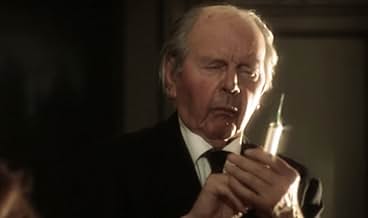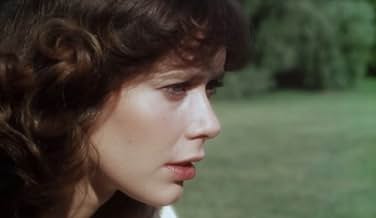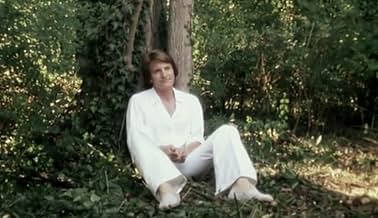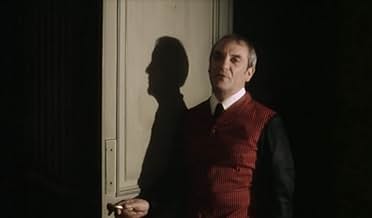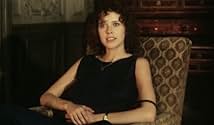IMDb-BEWERTUNG
6,6/10
1422
IHRE BEWERTUNG
Füge eine Handlung in deiner Sprache hinzuAlice leaves husband, car breaks down, spends night at manor. Next day car fixed but owners missing, she's trapped in walled estate, increasingly worried by strange discoveries.Alice leaves husband, car breaks down, spends night at manor. Next day car fixed but owners missing, she's trapped in walled estate, increasingly worried by strange discoveries.Alice leaves husband, car breaks down, spends night at manor. Next day car fixed but owners missing, she's trapped in walled estate, increasingly worried by strange discoveries.
- Regie
- Drehbuch
- Hauptbesetzung
- Auszeichnungen
- 1 Nominierung insgesamt
Jean Le Boulbar
- Le Premier Homme
- (as Jean le Boulbar)
Empfohlene Bewertungen
Saw this by chance late one evening.
Was attracted by the ambiance, which I found very Tarkovsky-esque, before I was attracted by Sylvia Kristel (she was not on screen during the first minutes I saw ;-)
Was surprised to see her act. Really loved the pace and the suspense. Found the conclusion wonderful, though-provoking, unexpected.
In my view this is clearly in the top 10 percent of Chabrol's production. I don't understand why this film is not well-known - maybe because it has an ex-erotic film actress in it?
A very good surprise.
Was attracted by the ambiance, which I found very Tarkovsky-esque, before I was attracted by Sylvia Kristel (she was not on screen during the first minutes I saw ;-)
Was surprised to see her act. Really loved the pace and the suspense. Found the conclusion wonderful, though-provoking, unexpected.
In my view this is clearly in the top 10 percent of Chabrol's production. I don't understand why this film is not well-known - maybe because it has an ex-erotic film actress in it?
A very good surprise.
10bogdank
A brilliant movie. I liked it because all the time everything seemed so possible, but strange until the very end where you're shocked finding out what was really going on. It gets you to think about so many things related to life, dreams, and death.
In my view this is one of the best Chabrol's movies. Unfortunately, it did not get as much attention as the others.
Sylvia Kristel was good in her role. She has actually shown she could act.
In my view this is one of the best Chabrol's movies. Unfortunately, it did not get as much attention as the others.
Sylvia Kristel was good in her role. She has actually shown she could act.
Surprising movie! A twist in the end! I like such movies, when the viewer is fooled ...when what we thought we understood is overturned! Reminds me of something from 'The Sixth Sense'. Do you agree? I didn't like the the acting of Silvia Kristel in a few sequences, as she seemed to be making some effort to speak. In the first shots with her husband, she acted strangely as she didn't seem distressed at all when announcing the latter that she would leave him. There was no visible stress on her face and she appeared relaxed when communicating her departure. The husband also acted strangely when he told her to stay one more night and to leave tomorrow morning! No one would have realistically said that! didn't like a few shots as well...For instance, some night shots in the beginning were not properly lit. But, it remains a movie with a great script, with minimal dialog, with each shot compelling us to ask...'what will happen next?'. The characters were all weird - and later we can deduce why...
I saw this movie on TV when I was 11 years old and it had a deep impression on me. Watching it again, I can identify many elements which are (and already were in the 1976) very conventional, or even outdated: the existentialist/ nouveau roman-plot, the Margritte-aesthetics, the "Psycho"-allusions...
The portrait of Alice (Kristel, sensuous as ever) and of her fate is sometimes of a certain merciless quality (misogynous tendencies?), but this movie is emulating the scenario of a real "cauchemare" far better than any other "Splatter" or "Horror"-Movie.
The portrait of Alice (Kristel, sensuous as ever) and of her fate is sometimes of a certain merciless quality (misogynous tendencies?), but this movie is emulating the scenario of a real "cauchemare" far better than any other "Splatter" or "Horror"-Movie.
I expected a film with a protagonist named "Alice Carroll" to have something to do with Lewis Carroll's Alice books, but Claude Chabrol's "Alice or the Last Escapade" (although it seems a mistranslation to me to go from "fugue" to "escapade") reminds me more of Luis Buñuel's "The Exterminating Angel" (1962) and seems to have more in common with a different book, which this film's Alice reads in one scene, Jorge Luis Borges's "Fictions." That would explain the quasi-surrealism, labyrinth and purgatory-like entrapment and genre elements closer to horror than to the fairy tales of Carroll. Besides the one character's name, I didn't see much here beyond a checkered floor pattern or a somewhat small door and a generally strange place and characters suggesting that the film took inspiration from the Alice books. It's not an especially egregious bait-and-switch in this regard, although it's a travesty to cite Alice for a film that also reads largely as a reactionary revenge fantasy on the era's politics of second-wave feminism.
Allow me to elaborate. The picture begins with the male gaze (the concept of the "male gaze," itself, being a product of feminist film theory of the same era as this film--within a couple years, in fact, as Laura Mulvey penned her essay "Visual Pleasure and Narrative Cinema" in 1975), as Alice's beau is watching TV. While doing so, he calls upon Alice to listen to him complain about his day. Fed up with this male-centric gaze and storytelling, she announces that she's leaving him. He assumes she's being hysterical (a more accurate reading of the "fugue" in the title, I suspect, with all the misogynistic connotations of diagnosing women "hysterical") and warns her against leaving that night. Undeterred, Alice drives off on her own escapade, but her being a female driver in a man's movie, she soon crashes the car. A film-within-the-film of her emotional reflections is even played out on the windshield before the glass is broken--suggesting the incident has more to do with the emotional storm inside her than with the rainy weather outside.
Alice takes shelter in a mansion in what turns out to be something of a twist on the haunted, old-dark-house formula. The strange men she meets here inform her that she's trapped there and that her state of affairs is a source of amusement for them. In other words, she's found herself the subject of the male gaze, of which she cannot escape. She's confined in a film, with the mansion its theatre. This is, perhaps, most striking in a sequence that would otherwise seem to be a display of gratuitous nudity, as Alice stands seemingly alone in her room with a disembodied voice speaking to her. She tries to cover herself from an unseen gaze. Who's subjugating her with this voyeurism? We, the spectator, are.
This is such a well-constructed bit of reflexive composition centered on the cinematographic apparatus--its gaze and, thus, our gaze. It makes for a more engaging picture than the questionable ideology and trite sexism displayed would otherwise deserve.
Allow me to elaborate. The picture begins with the male gaze (the concept of the "male gaze," itself, being a product of feminist film theory of the same era as this film--within a couple years, in fact, as Laura Mulvey penned her essay "Visual Pleasure and Narrative Cinema" in 1975), as Alice's beau is watching TV. While doing so, he calls upon Alice to listen to him complain about his day. Fed up with this male-centric gaze and storytelling, she announces that she's leaving him. He assumes she's being hysterical (a more accurate reading of the "fugue" in the title, I suspect, with all the misogynistic connotations of diagnosing women "hysterical") and warns her against leaving that night. Undeterred, Alice drives off on her own escapade, but her being a female driver in a man's movie, she soon crashes the car. A film-within-the-film of her emotional reflections is even played out on the windshield before the glass is broken--suggesting the incident has more to do with the emotional storm inside her than with the rainy weather outside.
Alice takes shelter in a mansion in what turns out to be something of a twist on the haunted, old-dark-house formula. The strange men she meets here inform her that she's trapped there and that her state of affairs is a source of amusement for them. In other words, she's found herself the subject of the male gaze, of which she cannot escape. She's confined in a film, with the mansion its theatre. This is, perhaps, most striking in a sequence that would otherwise seem to be a display of gratuitous nudity, as Alice stands seemingly alone in her room with a disembodied voice speaking to her. She tries to cover herself from an unseen gaze. Who's subjugating her with this voyeurism? We, the spectator, are.
This is such a well-constructed bit of reflexive composition centered on the cinematographic apparatus--its gaze and, thus, our gaze. It makes for a more engaging picture than the questionable ideology and trite sexism displayed would otherwise deserve.
Wusstest du schon
- WissenswertesSylvia Kristel said in a 1981 interview that she feels this movie bombed because she only had one nude scene. She said "For some reason the roles in which I keep my clothes on never become successful movies."
- VerbindungenFeatures Des chiffres et des lettres (1972)
- SoundtracksLe 24ème concerto en ut mineur
by Wolfgang Amadeus Mozart (as Mozart)
Performed on piano by Paul Von Schilhawski
Conducted by Rudolf Albert
Disque MUSIDISC.
Top-Auswahl
Melde dich zum Bewerten an und greife auf die Watchlist für personalisierte Empfehlungen zu.
- How long is Alice or The Last Escapade?Powered by Alexa
Details
- Erscheinungsdatum
- Herkunftsland
- Sprache
- Auch bekannt als
- Alice or The Last Escapade
- Drehorte
- Chateau des Migneaux, Villennes sur Seine, Frankreich(Mansion of Henri Vergennes)
- Produktionsfirmen
- Weitere beteiligte Unternehmen bei IMDbPro anzeigen
- Laufzeit
- 1 Std. 33 Min.(93 min)
- Sound-Mix
- Seitenverhältnis
- 1.66 : 1
Zu dieser Seite beitragen
Bearbeitung vorschlagen oder fehlenden Inhalt hinzufügen

